Hwyl fawrpublished at 14:21 GMT 26 November 2024
Eluned Morgan’s tenth session as first minister comes to a close.
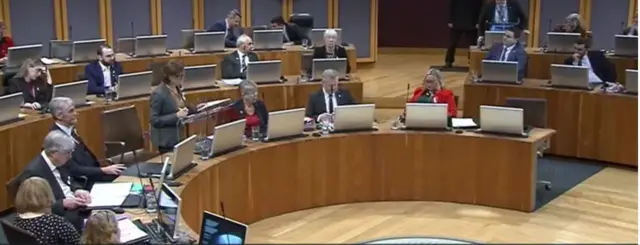 Image source, Senedd Cymru
Image source, Senedd CymruEluned Morgan is quizzed by opposition party leaders and other MSs during First Minister's Questions
By Alun Jones
Eluned Morgan’s tenth session as first minister comes to a close.
 Image source, Senedd Cymru
Image source, Senedd CymruPlaid Cymru MS Adam Price provides examples which he says show that "waiting times for ambulances in Carmarthenshire has reached a critical point".
He says, "I heard just this month from a constituent whose mother was in her nineties and had fallen and been injured at six in the morning, the ambulance couldn't get to her until two in the afternoon and she was in serious pain. In getting to A&E then, she had to wait overnight in that ambulance until she was taken to another hospital at three in the morning. In another case at the beginning of the month, a rugby player in Nantgaredig was injured, and he and the physios caring for him had to lie on the pitch, on a cold wintry night, for six hours, to wait for an ambulance to arrive from a hospital five miles away."
The first minister acknowledges the examples highlighted are "unacceptable".
She adds, "it's important that we encourage the ambulance service and the health board to improve that situation. But, of course, there is a great deal of pressure. It's difficult to get people out the back door of the hospitals, and that's what we're trying to do, and also prevent people from having to go to hospital in the first instance, caring for them in their homes. I'm pleased to say that Hywel Dda University Health Board has seen an improvement of 10 per cent in terms of red calls, as compared to the same month last year."
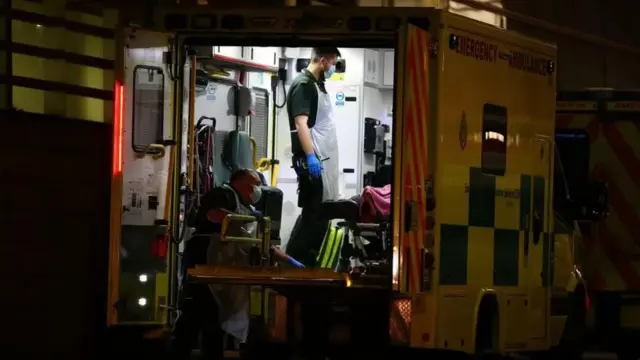 Image source, Getty Images
Image source, Getty ImagesLabour MS Hannah Blythyn refers to a Sky News investigation which revealed a culture of abuse and harassment among staff in the ambulance service.
The cases highlighted in the report were not in Wales, but she says "sadly we've seen before that such inappropriate and unacceptable behaviour is present across society and services".
She asks "what assurances can the Welsh government give both the workforce and the wider public regarding safeguarding processes and culture within the Welsh Ambulance Services University NHS Trust? In addition, surely the time has come for us to use what levers we do have in Wales for a pan-public sector zero tolerance approach to sexual harassment that includes avenues for whistleblowing, and one that has the full and firm collaboration, commitment and conditions of accountability for both employers and trade unions, however hard that is."
The first minister replies "I think it's important to note that actually the vast majority of people who work in our public sector behave incredibly well, and in a decent way. But anybody who conducts this kind of unacceptable behaviour should be chased out of town, frankly. It is not acceptable in our public sector today for us to have this situation in relation to sexual harassment."
She adds, "we've got to change a culture before we get to that, and I think it's really important for people to recognise that you know sexual banter is not acceptable, but actually that whole tone within workplaces needs to be shifted."
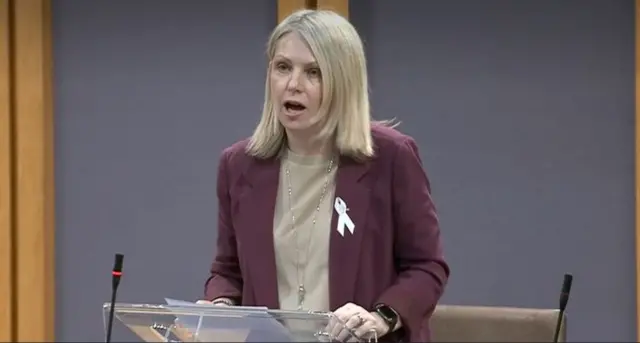 Image source, Senedd Cymru
Image source, Senedd CymruHannah Blythyn
Most GP practices in Wales do "exceptional work" says the first minister, but she adds the Welsh government will "chase down" those that "are not doing what they should" in complying with the new GP access contract.
She was responding to her Labour colleague Mike Hedges who said "Swansea East is covered by some excellent GP practices. When it goes wrong, and patients cannot get appointments, then pressure increases on accident and emergency departments... I have regular complaints about one GP practice. Can the Welsh government instruct health boards to monitor GP practice complaints and discuss them with GP practices?"
The first minister replied, "they've signed up to the contract. Ninety-seven per cent of practices told us they were achieving that commitment, supporting more equitable access arrangements across Wales. But you're right, there are some—and we all know who they are—practices that are not doing what they should, and you're absolutely right, I think it's important that we chase those down."
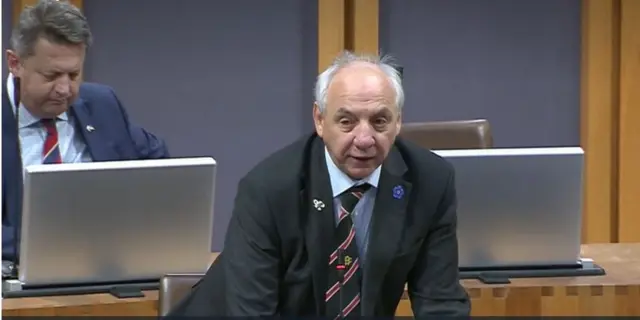 Image source, Senedd Cymru
Image source, Senedd CymruMike Hedges
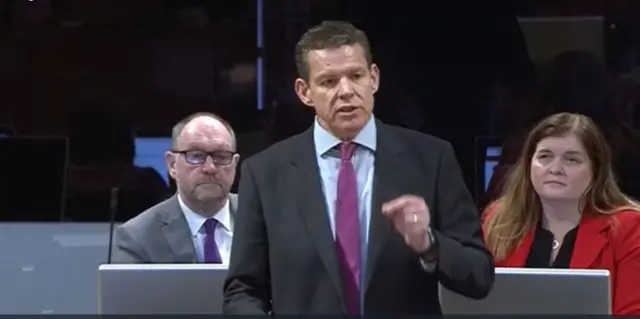 Image source, Senedd Cymru
Image source, Senedd CymruRhun ap Iorwerth
Plaid Cymru leader Rhun ap Iorwerth says there is "deep frustration that government doesn't seem to have learnt the lessons" since the flooding following Storm Dennis.
He says, "when storms hit in early 2020, we implored on Welsh government to hold an independent inquiry into flooding. Instead, we had a review, which couldn't give us all the answers, unfortunately, on infrastructure, on the investment needed, on warning systems—are they fit for purpose? Is the current multi-agency approach the right approach? Given, though, that we had repeated flooding again in Pontypridd in particular, does the government accept that there's deep frustration that government doesn't seem to have learnt the lessons, and what does she intend to do differently from her predecessors to make sure that we're not in this situation again, a few years down the line?"
The first minister replies "after the last flood, we got on with it, investing £300 million. Yesterday, I was pleased to be able to go and see some of the investment and what a difference that was making: real-time identification of where the floods were hitting, where the blockages were coming, looking at those culverts—a massive, massive investment in the culverts—and local authorities being able to monitor in real time, being able to send JCBs in to dig out any of the debris that had built up, which was then able to be removed, saving those thousands of properties. The system improved hugely, compared with what happened under storm Dennis. That is not a small amount of money. I accept that that is very little comfort to the people who were affected, and I know how devastating, just before Christmas, this must be for them, but we did learn lessons, and we have put in massive investment."
She also warns climate change means "I think we're going to have to accept that it'll be very difficult to protect every property. Climate change is not going anywhere, if anything, it's going to become more difficult".
Rhun ap Iorwerth also calls for more cash for coal-tip safety from the Labour UK government following the landslip in Cwmtillery, but the first minister says it would be "difficult" to spend more than the £25m already promised.
She explains, "it's not something you can put in place overnight and there will be limits in terms of being able to absorb additional money because there will be limits in terms of expertise, equipment. So, if they gave us the money, it'd be very difficult for us to use it all up because of the lack of expertise that we need to build up. So, as I said, Keir Starmer picked up the phone, offered support and we, of course, will be going back to ask for more money in relation to coal tips and I'm very confident that he will be forthcoming, as he was last time."
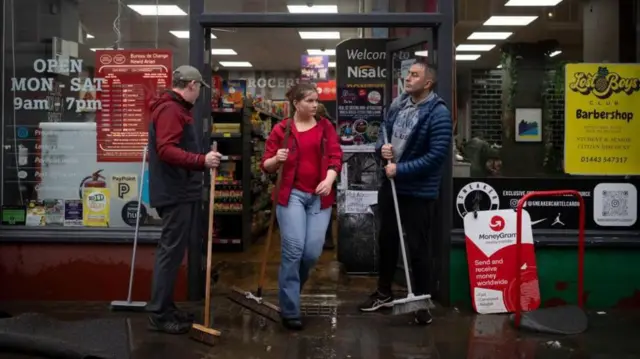 Image source, Getty Images
Image source, Getty ImagesA major clean-up operation has been taking place in Pontypridd, which was badly hit by flooding
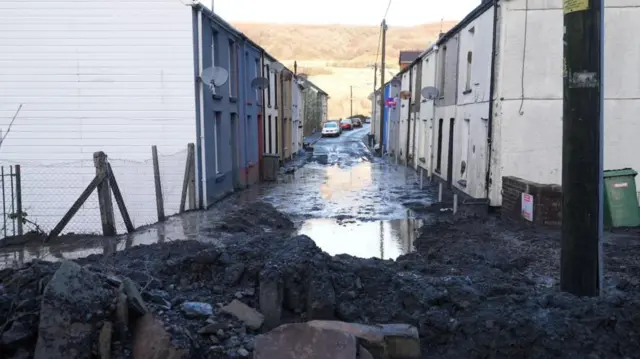
In Cwmtillery, Blaenau Gwent, houses were evacuated after a landslip
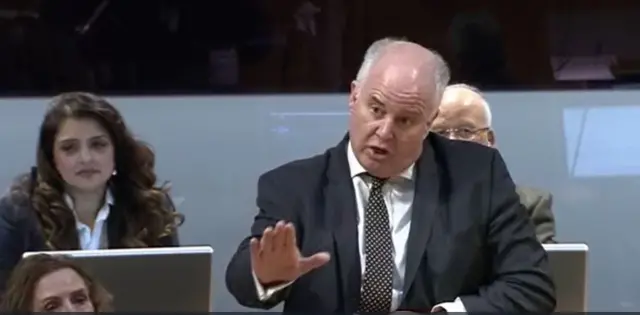 Image source, Senedd Cymru
Image source, Senedd CymruAndrew RT Davies
Andrew RT Davies, leader of the Welsh Conservatives in the Senedd, raises concerns about the "lack of urgency around warnings" ahead of the flooding that hit communities over the weekend.
He says "there is a genuine question that’s coming loud and clear from those communities that, if there was greater warning, then there could have been more preventive measures put in place. I fully accept the force of the water in many areas was enormous, but there was a genuine point around a yellow alert being issued [by Natural Resources Wales] when we were forecast by the meteorologists and others that a month’s rain was going to fall in a 24 to 36 hour period."
He suggests that lessons were not learned from Storm Dennis, which left much of Pontypridd under water in 2020.
The first minister replies "it’s been a devastating weekend for many, many families across Wales, where we’ve seen in particular those impacted for the second time after storm Dennis. They’ve seen storm Bert really create havoc in their homes and destroy lots of the property that they care about. I am particularly saddened to hear about the death of Brian Perry, who lost his life in Conwy."
She adds, "there will be lessons learnt, as we learnt them last time, and we will need to work with Natural Resources Wales in terms of seeing if there could have been better warning. I’ve called a meeting next week with local authorities and NRW just to assess the situation."
Andrew RT Davies also asks "what financial support is the government putting in place to support some businesses and individuals who are now in their second and third major flooding incident and ultimately will be facing a very bleak future unless there is some sort of intervention to support them?"
The first minister promises payments to households of £1,000 for the uninsured, and £500 for the insured.
Rhondda Cynon Taf council has said 200 properties were affected, with more than a month’s worth of rain falling in a very short period.
Natural Resources Wales has told the BBC that it would look into complaints that warnings came too late.
The Met Office has said it would conduct a full assessment but that the storm was "well forecast" in advance with a number of warnings issued.
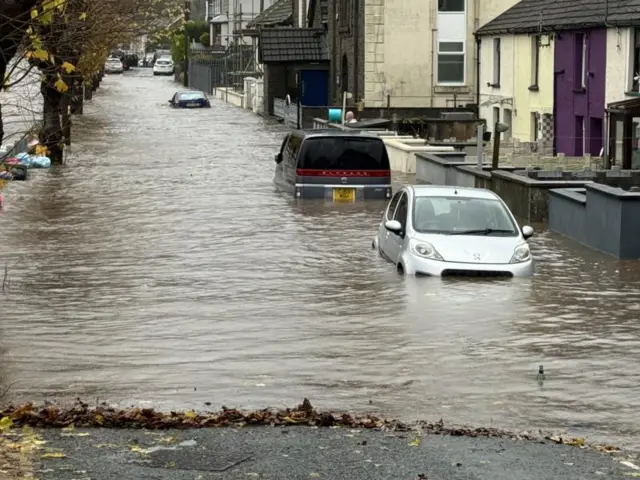
The river burst its banks again in Pontypridd
Conservative Laura Anne Jones "what assessment has the first minister made of the impact on local authority budgets of the increase in employer national insurance premiums?"
The first minister replies the "the UK Treasury has indicated additional funding will be provided to meet the costs of employer national insurance contributions in the public sector. Impacts on third and private sector service providers could affect local authority budgets."
Laura Anne Jones says Monmouthshire County Council has written to her, "setting out the financial impact of increased national insurance contributions that have been imposed by the Labour government. They estimate these changes will result in a direct loss of at least £3.5 million from an already overstretched budget. However, the true cost will be far higher as many of their service providers will face increased expenses, which will inevitably be passed on to the council."
The first minister replies, "we don't expect confirmation of the funding until the main estimates, which will happen in the spring to summer next year, so we can't give a detailed assessment. So, clearly, Monmouth can't be absolutely sure of what the implications are for them. But I appreciate this makes it difficult for local authorities to plan, and, obviously, we will work very closely with the Welsh Local Government Association to see how far we can go to get some sense of where this is likely to land."
The Chancellor announced in the budget that the rate that employers pay in National Insurance contributions will rise from 13.8% to 15% on a worker's earnings above £175 from April. The threshold at which employers start paying the tax on each employee’s salary will be reduced from £9,100 per year to £5,000. However, the chancellor said she would extend the Employers Allowance - the amount employers can claim back from their National Insurance bill - from £5,000 to £10,500.
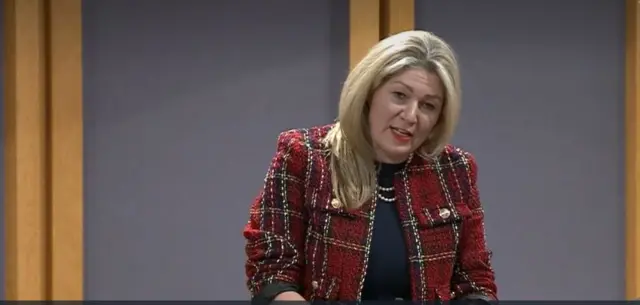 Image source, Senedd Cymru
Image source, Senedd CymruLaura Anne Jones
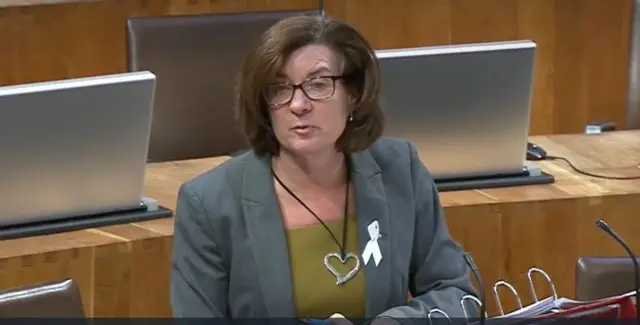 Image source, Senedd Cymru
Image source, Senedd CymruEluned Morgan
Llywydd Elin Jones conducts a ballot to determine the names of members who may table questions to the first minister.
Plaid Cymru MS Cefin Campbell asks "what assessment has the Welsh government made of the impact of inheritance tax changes on Welsh farms?"
First Minister Eluned Morgan replies "the UK government control inheritance tax. HM Treasury figures suggest that most farms will be unaffected by the changes announced by the government."
Cefin Campbell comments, "I’m concerned that the impact of Rachel Reeves's budget will be particularly bad for our family farms here in Wales, considering that the average wage for a hill farmer is only £18,000. How can they pay this inheritance tax on such a low wage? So, it causes concern to me that there has been no specific assessment of the impact of this."
The first minister concludes, "I think it is important that we return to the Treasury data. The UK Chancellor has outlined the stance of the UK government on agricultural property relief in terms of inheritance tax".
Last month, Chancellor Rachel Reeves announced that from April 2026, farms worth more than £1m will face an effective inheritance tax rate of 20% - half the usual rate of 40%.
BBC Verify has reported that the likely number of farms affected in the UK each year is around 500.
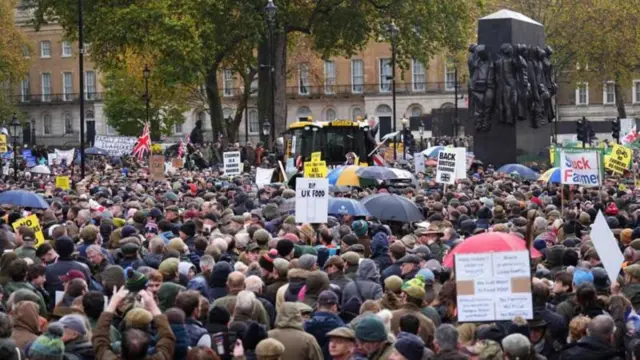
Around 10,000 attended last week's farming rally in Whitehall
Hello and welcome to our live coverage of Eluned Morgan’s tenth session of First Minister's Questions.
The meeting is held in a hybrid format, with some members in the Siambr (Senedd chamber) and others joining by video-conference.
You can click on the play button above to watch the proceedings from 1.30pm.
